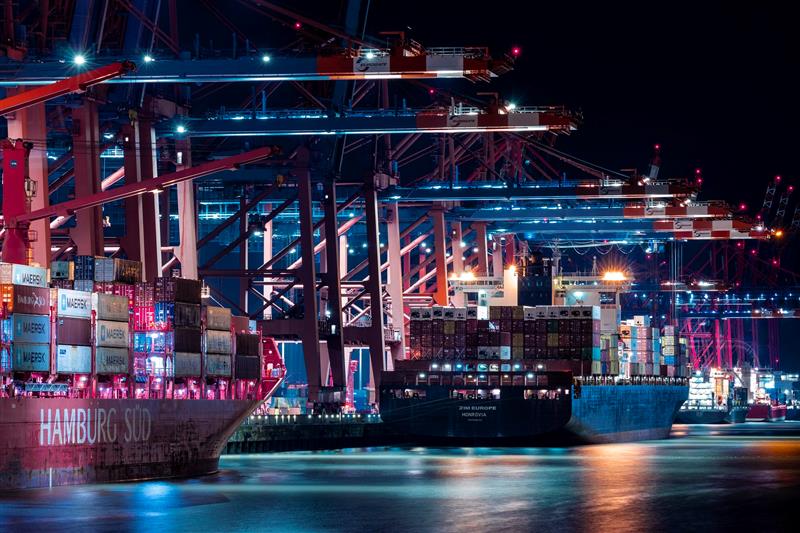by Philipp Mühl (Global Counsel) and Simon Baumert (Bernstein Group)

Our world is becoming increasingly fragmented. This new geo-economic reality inevitably impacts German SMEs. Sometimes entire business models are at stake if supply chains are disrupted or access to important markets is blocked. However, companies are not defenseless against these developments. With early warning systems, solid operational risk management and active participation in political debates, companies can minimize risks and even emerge stronger from the current globalization crisis.
Whether it’s supply chain disruptions due to attacks on cargo ships in the Red Sea, rapidly rising energy prices because of the Russian war of aggression in Ukraine or collapsing profit margins due to tariffs: hardly a day goes by without companies being confronted with the effects of geo-economic conflict lines. The days when managers could ignore political developments are over.
It is by no means only large international corporations that are affected. On the contrary: SMEs, whose success is often based on their integration into global value chains, are particularly at risk. In contrast to VW & Co, hidden champions cannot simply relocate their production to other markets such as the USA or China. They are also particularly dependent on exporting specific products, where they are the leading producers worldwide. This makes SMEs more vulnerable to targeted trade barriers.
The peak of globalization has passed
Current IMF analyses provide a strong indication of how far de- or at least re-globalization has progressed. As a result of growing sanctions and restrictions, foreign direct investments are increasingly being made within geo-economic blocs, for example within the West or within an undefined sphere of influence of China or Russia, but less between these emerging blocs. This applies in particular to strategically important industries of the future such as renewable energies or semiconductors.
The risks are already manifested, especially in trade. According to a DIHK survey, 61% of German companies perceived an increase in trade barriers in their international business last year. This perception is in line with empirical data: according to IMF projections, the share of imports and exports in global GDP will fall in the coming years. This is bad news for German SMEs, which, with their often export-based business model, are particularly sensitive to these developments and contribute to more than a third of Germany’s total exports.
At the same time, the European economy is becoming increasingly dependent on imports, including from geopolitically sensitive countries. China is only the most prominent example here, albeit the most significant: according to calculations by MERICS, the EU is dependent on imports from China for 421 out of a total of 5,113 product categories. It would be a mistake to dismiss 12% dependency as low. After all, many of these dependencies involve critical components or preliminary products such as rare earths, magnets or electronic components, without which the production of other goods would be impossible or considerably more difficult.
The business risks associated with geopolitical developments cannot be viewed in isolation. Their impact can be felt in every area of a company, from procurement (e.g. Chinese export controls on critical raw materials such as antimony), to research & development (e.g. Dutch export restrictions on advanced chip technology), to sales (e.g. the universal tariffs of 10-20% announced by Donald Trump).
In recent years, the right considerations have therefore been made to anchor geo-economic risks centrally in the company and in corporate strategies as a cross-cutting issue. It is true that a deep understanding of geopolitical interrelationships and interdependencies is crucial to avoid new dependencies. To this end, companies need to build up specialist expertise to recognize risks early on and be able to react quickly in the event of an emergency.
However, these discussions were mainly conducted from the perspective of large, global corporations. The particular challenges faced by German SMEs were often ignored. They have far fewer resources to set up their own geoeconomics department, let alone find suitable staff for it. Relying solely on the market expertise of proven local sales partners, on the other hand, fails to recognize the current complexity and importance of the geopolitical component for daily operational and strategic decisions.
The SMEs and hidden champions that are so important for the German economy end up in a certain wait-and-see position – at the mercy of the decisions of political decision-makers and the risk management departments of their major customers, who often outsource their compliance and reporting obligations to their suppliers. At the same time, SMEs have many opportunities to transform themselves from objects to subjects in the geo-economy of the 2020s and beyond.
Regional thinking, global politics
Of course, even SMEs cannot avoid taking a few basic steps on their way to becoming a geopolitically fit company. The first step is always to analyze your own activities: To what extent are my sales concentrated in individual markets? How dependent am I on individual suppliers for certain products? The entire value chain should always be considered, from raw materials to the further use of your own products by customers and their distribution and dependencies on individual global markets. Ongoing developments should be closely monitored. It may be worthwhile drawing on external expertise and initially developing a plan to actively reduce risks – e.g. by diversifying or changing suppliers and developing contingency plans.
SMEs and hidden champions should, however, focus on their own strengths. Their competitiveness often stems from the fact that they offer unbeatable and hard-to-replace quality in a niche market. This self-confidence should be used in negotiations with major customers to translate individual needs and strengths into joint geo-economic risk strategies. Only when a value chain is integrated, it can really be protected against political changes in the long term, e.g. through joint resource pooling, the establishment of a cross-company competence center for geopolitics, or the financial protection of diversification strategies.
The same applies to politics. For many entrepreneurs, it may seem absurd to develop a positioning as a medium-sized company in the face of global political changes. However, managers should keep in mind to “think globally, act locally”. Owner-managed, family-run and regionally rooted global market leaders are of enormous importance for individual regions. This applies to economic development, jobs, but also to the creation of identity and communal cohesion. Regional politicians, but also representatives of the state government and constituency representatives, are therefore receptive to the concerns and needs of these companies.
In the Germand federal system, which is designed to preserve and balance regional characteristics, Germany’s position on international issues can be meaningfully enriched through a wide variety of channels. Questions about the regional economic importance of individual economic sectors complement traditional foreign policy considerations. To see what this could look like, it is worth taking a look across the Atlantic. In May, the Biden administration announced comprehensive Section 301 tariffs on Chinese products in green technologies. In the final product list in September, however, there were a few exceptions – such as for harbor cranes, for which there is no manufacturer in the USA. As German SMEs, often referred to as hidden champions, usually manufacture products that are difficult to replace, their geopolitical importance should not be underestimated.
Donald Trump’s recent election victory in the US makes it clear that the global economy is likely to become increasingly fragmented over the next four years at least. Companies must therefore not only recognize geo-economic risks, but also actively manage them. SMEs are particularly susceptible to external shocks due to their export orientation and integration into international value chains. But they should not adopt a wait-and-see attitude: As hidden champions, they are right in the middle of the geopolitical competition for economic independence and technological progress. They can and should act with the appropriate self-confidence.
Factbox: Navigating geopolitical uncertainties – Three essential steps for German SMEs
- Strengthen risk management: Implement early warning systems, continuously monitor your supply chains and political developments to be able to react quickly to disruptions.
- Drive diversification: Reduce dependencies by identifying alternative suppliers and tapping into new markets to increase your business stability.
- Help shape politics: Engage in political debates and build relationships with decision-makers to effectively represent your interests.

Philipp Mühl is an Associate Director in the Berlin office of the global strategy consultancy Global Counsel. He helps international companies, investors and start-ups to maintain an overview of the complex political system in Germany and Europe.

Simon Baumert is an Associate at the Bernstein Group in Berlin, where he develops strategies and concepts to bring clients’ concerns into the political arena. He advises clients on energy and economic policy issues with a global focus.